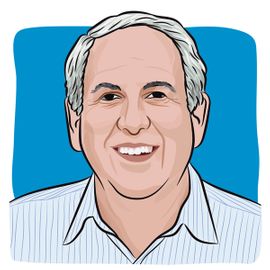- About Us
- Advertise / Support
- Editorial Board
- Contact Us
- CancerNetwork.com
- TargetedOnc.com
- OncLive.com
- OncNursingNews.com
- Terms & Conditions
- Privacy
- Do Not Sell My Information
- Washington My Health My Data
© 2025 MJH Life Sciences™ and CURE - Oncology & Cancer News for Patients & Caregivers. All rights reserved.
The Easy Part of Cancer

William Ramshaw resides in the expansive Pacific Northwest. He is a six-year survivor of pancreatic cancer and has written a memoir Gut Punched! Facing Pancreatic Cancer.
Most of us dread, simply dread, hearing the words, “I’m sorry you have cancer.” I did.
People experiencing a near-death event often talk about having their life flash before them in ultra-fast-fast forward, now I know what they mean. When I heard those words with “pancreatic” thrown in to give them an extra kick, I felt like I had been drop-kicked. Would I be there for any of my three daughters’ big days or would one of my brothers have to serve as a sort-of-dad stand-in? I didn’t know.
Those five words are among the most terrifying that can fall out of any doctor’s mouth. But yet, once one hears these words, their terror seems more like a snarling and snapping dog that is all bark and often only nips. At least for me, finding out I had cancer was the easy part. Much like that sharp pain when a band-aide is ripped off, I winced but at the same time, I dug in for the fight. (Sadly, for some, these same words freeze them in a block of fear rather than calling them to action.)
For me, being a type-A guy who looks at everything life throws at me as a do-or-die challenge, I set out to survive. Once I understood I had pancreatic cancer with a hideous survival rate so low many consider it a death sentence, I read everything I could find about it. Using the FDA regimen I was to be treated under helped me focus my reading. Simply Googling name-the-cancer often turns up spurious stuff that has little medical relevance.
As much as knowing more about your cancer can be debilitating, it can also be liberating. A well-informed patient can engage in substantive conversations with their doctors. It allowed me to participate in my care rather than having it done to me.
Make no mistake, there is nothing easy about the path from finding out you have cancer to celebrating survival, which is like scaling a vertical wall of rock and ice similar to climbing Mt. Everest: treacherous, especially in the death zone above 26,000 feet where oxygen is near non-existent, everything matters. Not only following your doctor’s orders but understanding the “why” behind them is crucial. If you don’t understand, ask questions until you do. An answer like, “because I’m the doctor” is of little help. But from my experience, most doctors seem to appreciate an “engaged” patient rather than one who “forgets” to follow their orders. Cancer is not like a common ailment where not following your doctor’s orders gets you a stern look and the talk. It can be life or death — your life.
For me, after turning yellow and having my bile duct stented (a scraping taken during the stenting revealed my cancer), everything happened in blinding succession. After quick meetings with my surgeon, and the doctor who would administer my chemo, along with the one who would radiate me, everything happened all at once. I had a several-hour Whipple procedure to extract a 1 cm tumor sucked up to my bile duct, followed by 30 radiation sessions augmented with a chemo pump followed up with six more chemo sessions. Most will tell you “cancer-time” is surreal. So much is happening, it’s hard to keep track of all the appointments, the scans, and the tests, it seems endless and worse, never-ending. I vaguely recall my last chemo session some 10 years ago, but I still have my rather cheesy, yet cherished, completion certificate stashed away. It’s not lost on me to still be around when few see two years, and most don’t see five, making me not only a unicorn, but a multi-colored one.
Why I survived this remains a mystery, as I had no special treatment. Being far too sick, and unable to travel, I couldn’t participate in a cancer trial with some exotic yet-to-go-to-market wonder drug. Other than attributing my survival to having an experienced surgeon who I recently found out had done more than 600 Whipple procedures, it is hard to say why I have survived thus far. In trying to understand, a couple of years ago I participated in a full genetic study where they looked at 84 genes but found nothing spurious. So, who knows why I beat the odds and survived? I can tell you this unicorn is showing all his colors.
Every six months, I have follow-ups to make sure my cancer remains at bay. Nothing is easy about these things. Like most cancer survivors, I dread them, but I know they are a must. My life may depend on them finding a new outbreak of cancer and restarting my treatment post haste. I hope never to hear the second most dreaded words one can hear from a doctor, “I’m sorry your cancer has returned.” If I get those words, make no mistake, I will be back in fight mode.
And oh, by the way, I got to be there for two of my daughters' weddings when I didn’t expect to be there. I’m holding out for the third, my baby.
For more news on cancer updates, research and education, don’t forget to subscribe to CURE®’s newsletters here.
Related Content:



